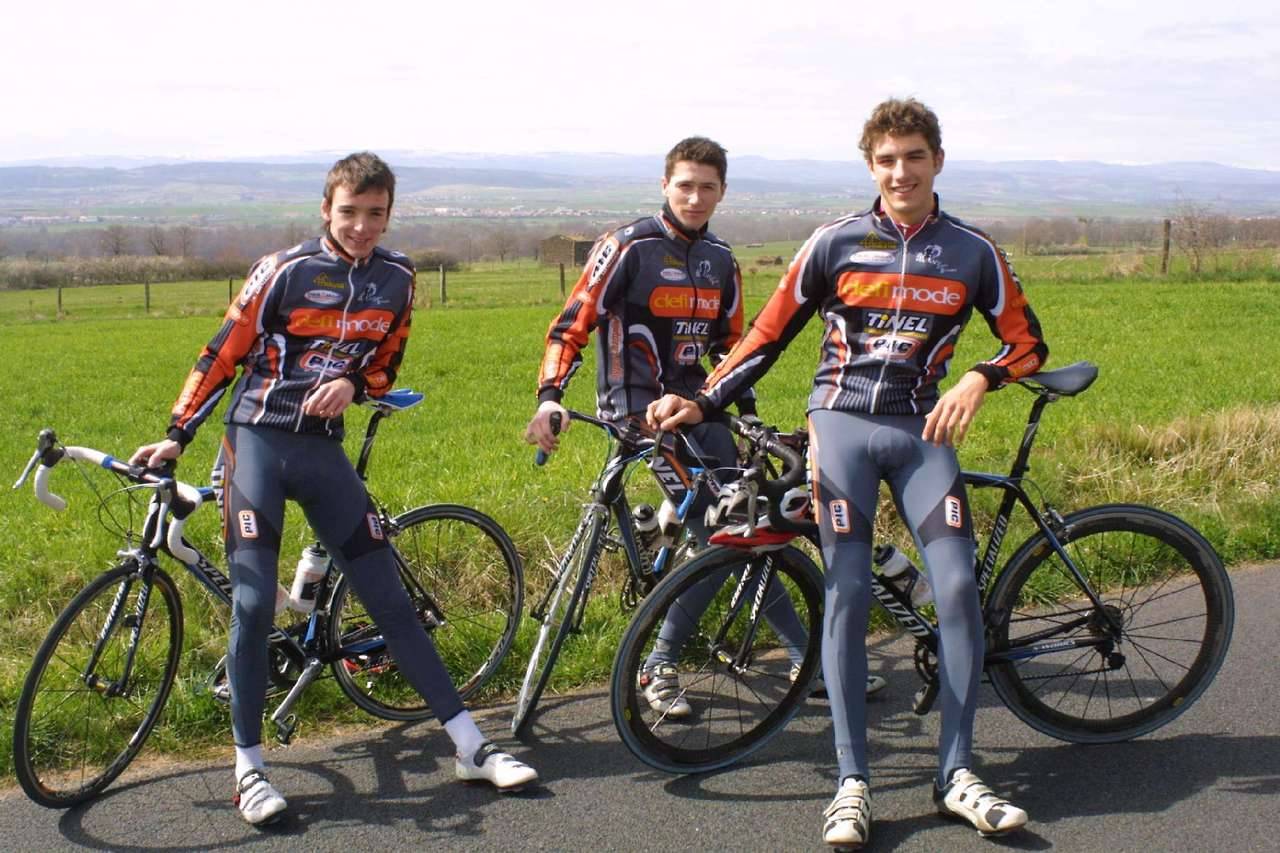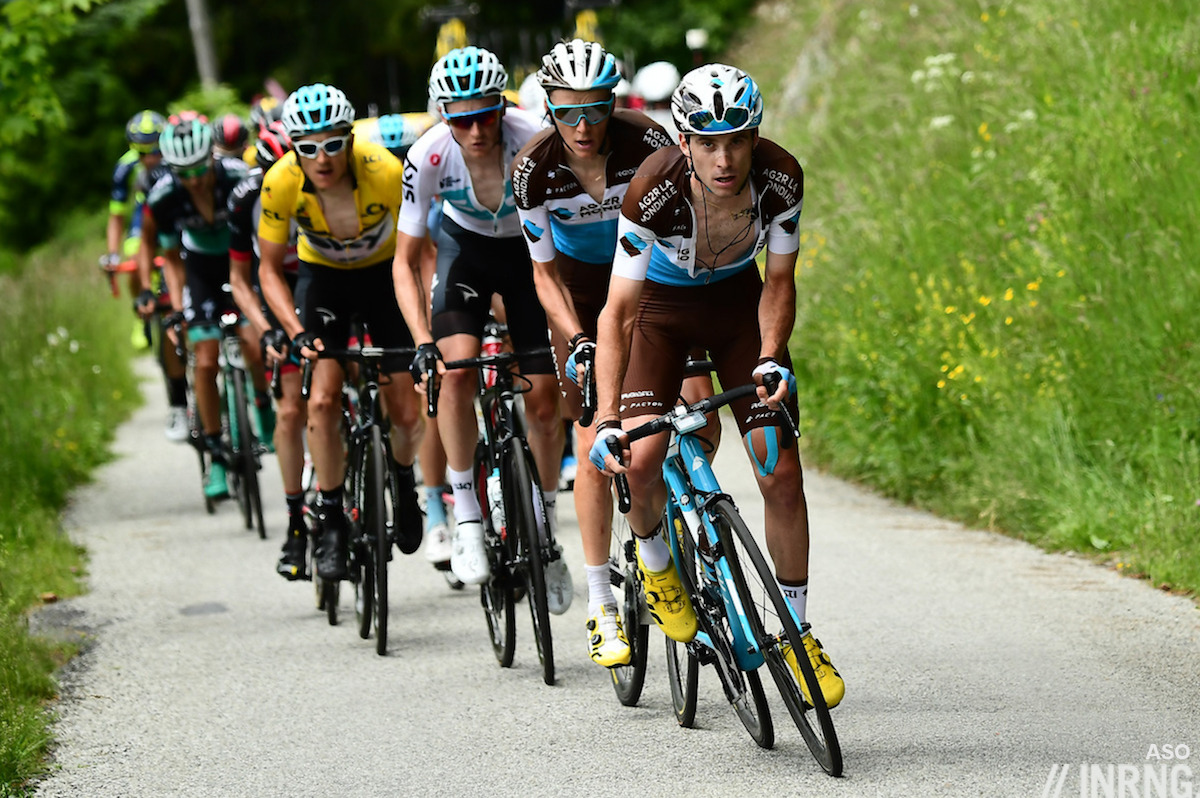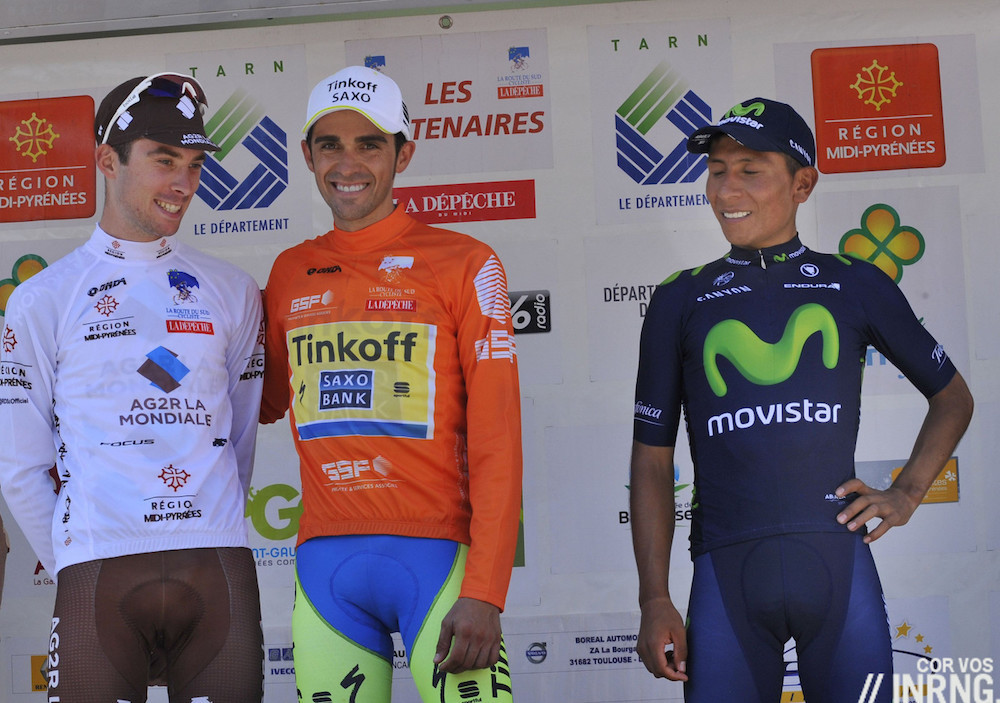Jonathan Milan’s already got one stage and is in the yellow jersey but has a challenge to repeat today.

Milan does the business : a scare for Milan on the penultimate climb but he got back with help from his team. On the last climb Romain Bardet had a go, a show for his supporters who were waiting on the same slopes. Lidl-Trek left it late for the lead-out but that’s often a successful move as long as they’re not stuck in traffic because of the course.
Once again Milan in full flight is a terrifying sight, as if any second a crank could snap or his bars disintegrate and he’d slam into the tarmac. It’s all force and movement too. But it works so well and he looked irresistible in the finish.
The Route: 202km and 3,100m of vertical gain. It’s uphill from the start and then across the Forez, the mountainous forests of the Massif Central.
The Château Jaune climb featured in Paris-Nice on the “wall stage” won by Lenny Martinez. This climb was the first and helped dynamite the peloton into bits but in part because the bunch knew more was to come, this time the finish is only 20km beyond. It has a gentle start and a “nothing to write home about” feel to start then it starts to bite and soon it’s on a 16% ramp with more to come. But it’s short.
The Finish: country roads into the small town of Charantonnay and then it’s slightly uphill to the line inside the final kilometre.
The Contenders: Lild-Trek should chase today, Jonathan Milan is in the yellow jersey and a pick for the stage but he’ll struggle on the final climb. But we’ll see who goes up the road, today is open to more riders when later days are not.
| – | |
| Van der Poel, Milan | |
| Latour, Velasco, Laurance, Penhoët |
Weather: sunshine and 26°C.
TV: KM0 is at midday and the finish is due for 17.15 CEST. The last 90 minutes are on TV and the Château Jaune climb is around 16.45.

Postcard from Brioude
A tale of two retiring riders. Romain Bardet grew up in Brioude, today’s start town and he’s still a member of the local club, Vélo Sport Brivadois. He took some local kids out for a training ride last week. He’s had an exemplary career, not only making the most of his abilities but compelling Ag2r La Mondiale to try and match his ambitions, prompting the team to up its game and even nicknamed toujours plus, “always more” by management because he was demanding.

At a time when the sport was cleaning up its act he took inspiration from Dan Martin‘s wins, like in Liège, as signs if he could do it then so could Bardet. A lot of Bardet’s career has been about trying to find order among chaos; right down to picking his retirement date, to leave at the end of this race that even has a stage in tribute, much better than finish on a melancholic autumn day.

The other is Pierre Latour, long a team mate of Bardet. Today’s stage crosses the Rhone to ride into the Isère department on some of his training roads. He’s arguably brought chaos to the sport, often in a fun way. He burst onto the scene in 2015 when he was duking it out for a stage win in the Route du Sud against Nairo Quintana and Alberto Contador, even if he’d gone up the road to build up a cushion but it was still impressive.

His Vuelta stage win in 2016 and the duel with Darwin Atapuma was gripping, but his only World Tour win. This led to plenty of pressure but he wasn’t formatted for it, he might have a Vo2 Max in the 90s but he wanted to have fun along the way.
Lately enjoyment has been hard because of a recurrent descending phobia, he’s tried everything from descending lessons to riding motorbike on a circuit and several mental coaching. It can go away but one scare and it returns, limiting for a rider whose talent is best deployed on hilly days. This means he’s set to retire at the end of the year, at the age of 31 and if he can’t pick his moment or have a stage as a tribute this week, look out for a final flourish along the way.


Both relatively young to be hanging up their wheels. It’s a tough sport to commit to, squaring constant travel, training and danger with a family and a home life.
Have they got ambitions to stay in the sport in some capacity?
Bardet wants to do lots of sport but on his terms rather than from the team car or on the road away from home, as soon as he finishes the Dauphiné he’ll switch to gravel racing. He’s had a column in L’Equipe and could continue this too. Latour says he might become a sports coach but in general he says, so he learns about new sports but has no fixed plans, he says he’s open to ideas.
Plenty of teams here with no sprinter to compete with Milan. So why did none of them send riders to join in Bardet’s late Stage 2 attack? Instead they happily left Bardet to wilt alone and escorted Milan to his (almost) inevitable victory. The heroics of Stage 1 should have been more inspirational.
We’ll see for today as for many riders it’s either now or Thursday for a breakaway and that’s it for the month until the national championships for plenty. But easier said than done, Alpecin will chase today, possibly Uno-X and IPT.
Perhaps the peloton granted Romain that attack in front of his home fans?
The descending thing is interesting because I have no idea how they do it. My best guess is that some are born with lightening reflexes.
Descending has been one of the last arts in the sport, in a time when teams have tried to control everything it’s hard to master this area. Bardet was one to realise this, he tried to exploit descents as he knew trying to outride the Team Sky train uphill was a tough ask.
It’s skill some have early, eg Mohorič being late to meet his friends and racing downhill to catch them up; but teams do work on this. Many have hired Oscar Sainz, he gives workshops to teams on training camps and 1-to-1 lessons during the season if needed. Luke Plapp is a case study, he has the “big engine” but when he got to Europe he was expected to follow the peloton downhill only he’d never done anything like it. So Ineos got Saiz over for some coaching to share some of the skills and increase his confidence.
It’s a point made here before but Latour attended a descending camp with amateur racers and they did some practice descents and he finished well ahead of everyone, ie even with this phobia he’s quicker than 99%. But you could see it on the Tour stage to the Grand Colombier won by Kwiatkowski in 2023, on an open high speed descent mid-stage he just couldn’t keep up when the stage win, or at least the contest, was there for the taking if he could stay with them.
There is an anecdote about Russel Mockridge who supposedly slowed down in a race (Sun Tour I think) because he was worried that he was going too fast for the motorcycles … and he couldn’t see from one side of the road to the other without his glasses.
Be fascinating to read more about Saiz’s journey from DH racer to road coach. I remember him as a very good rider, a little below the level of Voullioz, Peat, Minnaar. Top tens, not podiums. Perhaps this meant he was always striving, learning, and this has made him a good coach?
I really don’t want Bardet to retire from the pro peloton. He’s always been a rider I’ve admired, cemented during the years of Sky/Froome dominance when he did everything in his (considerable) power to turn the tables on them – if only he could time trial better!
It was good that boring normal service was resumed yesterday. Talk of “new cycling” is largely nonsense, nothing new to see here!. Hopefully some less heralded riders can compete for the stage today, GC folk have the TT tomorrow.
My French partner can name only three recent French cyclists (Pinot, Bardet and Alaphilippe). I can’t image Magnier, Grégoire or Martinez ever having the same popular affection though maybe time will prove me wrong.
It’s probably more about Monument wins, Tour de France podiums and World Championships than time I suspect.
I’m guessing a narrow win for the break over Trek & the sprinters. Tomorrow will be an easy day for many so a larger then normal break. Maybe a GC team sends a guy up the road with the break too.
Interesting that even though UAE had the yellow jersey and Trek & Alpecin were going for the stage, Visma had nearly the full team on the front during the TV time, up to the 3km mark.
I wonder about Rowe at Decathlon Ag2R.
Also thanks to Bardet’s presence, they sort of sold an image of themselves as a clean environment (a little like the whole French movement has been doing). There are reasons to set some question marks but I won’t now.
So they eventually end up hiring Rowe as a DS.
What I consider shocking is that he reportedly just released an interview to The Guardian to launch his new book where he’s not ashamed to bring on a narrative about Team Sky being doubted by “haters” only because such suspicions depended on the sport coming from the Armstrong scandals (Disclaimer: I read CN report not the Guardian piece).
However, the timeline of such a theory could be well worth being revised, to start with, but let’s keep this short: how can the man suggest something so simplist and self-exonerating nowadays, after all that surfaced in the following years?
Again, let’s limit it to the bare minimum – their chief doctor being finally and officially banned from the sport, as well as from being permanently struck off from the general registre for repeated misconduct and knowingly doping athletes.
You’ll also read pearls like cycling being doping-wise “in the best state it’s ever been in” (as it always is, of course!) because the bio-passport “really has cleaned up the sport”. Is he including Sky era in that best state, I must suppose. Or isn’t he?
The only sentence which can be deemed as utterly sincere is “chemistry in the team was quite special and unique”. For sure! Freudian or tongue-in-cheek?
Rowe is entitled to tell the story which most pleases him, while no journo apparently considers it appropriate to ask further questions (check disclaimer above on this).
…But what’s his current team take on this?
“and knowingly doping athletes”.
That was the bit that was never proved.
Richard Freeman bought 30 sachets of Testogel. The rider who was the intended recipient of the substance wasn’t named.
That got him struck off the medical register in 2021 and in 2023 he was banned from all sport for 4 years (backdated to 2020) for breaking anti-doping rules.
Tell it to BBC and the medical tribunal…
https://www.bbc.com/sport/cycling/56367117
“Ex-British Cycling and Team Sky chief doctor Richard Freeman has been found guilty of ordering banned testosterone in 2011 ‘knowing or believing’ it was to help dope an unnamed rider.
A medical tribunal ruled Freeman ordered Testogel with the knowledge ‘it was to be administered to an athlete to improve their athletic performance’.”
You missed my point. It wasn’t proved.
I think it was ‘proved’ to everyone’s satisfaction, (except yours, apparently).
https://www.theguardian.com/sport/2025/jun/08/cycling-luke-rowe-reader-interview-road-captain
Oh, ok, no much hypocrisy here at least, he implies he’d have loved to be directed by Bjarne Riis and Rolf Aldag… the message is clear. No issue with the past of people. I can even be fine with that, really, only it doesn’t sounds like the French narrative on things, which was my point.
Wow, reading the whole thing is really quite terrible. Even praising the Sky bullying to attackers, although he doesn’t put it like that, but I recall the images of Froome and Aru.
And the part of “no team managed to dictate a race as we did” is also creepy, given that some past teams actually managed to, and it wasn’t a good sign at all.
Bit ironic that this is in the Groan! Since they were the cheerleaders in the anti -Sky brigade. Fathering ham couldn’t mention Froome without the epithet ‘Kenyan born’ as if being born in Africa was somehow unsuitable for a cyclist. BTL used to take the p…ss mercilessly.
@ gabriele +1
From Cycling News Live blog
“176km to go
Remco Evenepoel attacks!”
Not something you see everyday!
It was for a hunt for a bonus second or two at an intermediate sprint. The concept of a solo effort from 176km seems a bit much even for the advocates of “new cycling”!
To follow up on Giro TV data, I retrieved my figures and I think that part of the divergence depends on issues with the source material.
On the last Sunday, we’ve had different kind of Auditel strikes both in 2023 and 2024, but some sources still reported varying figures for the final stage (which – if a sprint and not an ITT – greaty lowers the general average, but it’s to be seen exactly how much – I’ve seen figures ranging from 900K to 1.3M for both years).
Plus, two stages during Pogi’s first week suffered from serious broadcast difficulties, one due to another strike, this time by the journos, if I recollect it correctly, which means that it was broadcast totally mute; three days later the overlapping with some other sports event meant that the channel shift wasn’t the usual one, which impacted both the measurement of data and probably on the numbers of viewers themselves, too.
So, a lot is about on how the researcher or the institutions decides to tackle this situations, albeit the corresponding figures are simply included as they are in most analysis I’ve read.
For example, RAI gives a press release in 2024 comparing recent averages after 11 stages with the following data: 1.549M (2024), 1.536M (2023), 1.416M (2022), which suggests that thay must have had different figures regarding the stage with the confused channel hop, although of course they can’t do anything to deal with the muted stage, which simply many people didn’t watch, even if some did (1M viewers…! Shocking low compared with the second worst at 1.3M, shocking good if we think people watching 90 minutes at least of cycling on a flat stage with no commentary either).
To solve the question of the muted stage (also included in the first 11 ones), there are different options of weighing averages, but this becomes technical.
Finally, to offer a more intuitive benchmark, we may also check the data for the last week, excluding the Sunday stage because of the Auditel strike (and I personally haven’t data for 2025 either). We have these series:
2025 = 2.0-2.0-1.7-2.1-2.4
2024 = 1.9-1.9-1.7-2.0-2.6
2023 = 1.8-1.6-1.9-2.5-1.9
As an amateur, I don’t have to choose what methodology should I stick to in order to treat anomalies, but, on a very personal level, if I had to “spit” a number for the 21 stages, my estimation would set 2024 very slightly above 1.7M and 2023 very slightly below (I’d pick the favourable trend and the stardom effect as positive factors for the final show in Rome 2024, the other way around for 2023). Anyway, not what I would qualify as a big difference as such.
Reviewing with hindsight all the numbers, I’d say that the situation in recent seasons is steady, even if a proper correction to weigh the effect of the muted stage would probably bring Pogi’s Giro above the rest (but not that much, either, it’s maybe some +10K on the final general average).
With all the figures at hand, the Pogi effect meant having a huge Grande Partenza, probably the best seen in many years (1.7M and 2.0M from scratch, whereas the GTs usually start slow…), but then too many sprint stages (not pure chance, it was done to keep the route easy in order to entice him to participate and try the double, hence it’s his “falut”). Sprint stages kill the Giro audience like ITTs or worse, unless they’re at least a bit hilly in the finale, which wasn’t the case in 2024. All in all, people weren’t surely kept away by the final results being already decided.
I didn’t find my file for 2022, but according to what I happened to read in the various RAI press releases, its average after 11 days was 120-140K below 2023 and 2024, and although the Marmolada stage eventually had some beasty results (close to 3M!), I’m not sure it could recover from such a deficit, so it was probably 2022 the recent Giro with worst general audience results. But I’d need the actual figures.
Btw, the split of Warner Brothers / Discovery may lead to more fragmenting of cycling coverage. Or maybe the opposite, maybe will get a more dedicated streaming service without Max’s entertainment offerings. But I’d think it would cost more because the TNT sports unit is the one losing money and dragging down the share price. We’ll see.
When they killed GCN it ended up being ok for me because my family already had HBO/Max anyway. Now I’m wondering what the future of that will be.